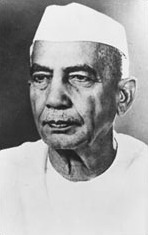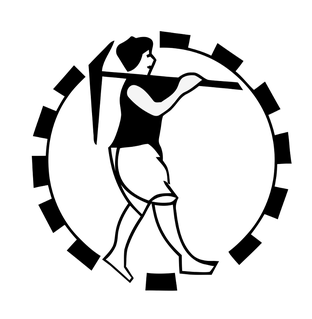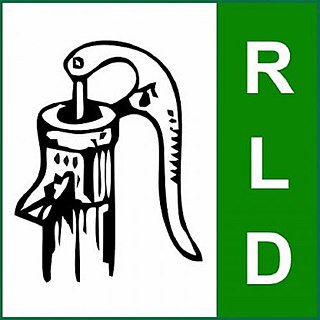
Chaudhary Charan Singh was an Indian politician and a freedom fighter. He served as the 5th Prime Minister of India and 5th Chief Minister of Uttar Pradesh.

Janata Dal was an Indian political party which was formed through the merger of Janata Party factions, the Lok Dal, Indian National Congress (Jagjivan), and the Jan Morcha united on 11 October 1988 on the birth anniversary of Jayaprakash Narayan under the leadership of V. P. Singh.

The Janata Party was a political party in India. It was founded as an amalgam of Indian political parties opposed to the Emergency that was imposed between 1975 and 1977 by Prime Minister Indira Gandhi of the Indian National Congress. In the 1977 general election, the party defeated the Congress and Janata leader Morarji Desai became the first non-Congress prime minister in independent modern India's history.
Utkal Congress was a political party in the Indian state of Odisha. It was formed in 1969 when Biju Patnaik left Indian National Congress. After the 1971 Odisha elections UC took part in the Bishwanath Das ministry in the state. In 1974 Utkal Congress merged into Pragati Legislature Party which eventually merged into Bharatiya Lok Dal.

Samyukta Socialist Party, was a political party in India from 1964 to 1977. SSP was formed through a split in the Praja Socialist Party (PSP) in 1964. In 1965, Ram Manohar Lohia merged his Socialist Party (Lohia) with SSP and contested in 1967 Indian general election. In 1972, SSP was reunited with PSP, forming the Socialist Party. But in December 1972, SSP was recreated after the split in Socialist Party. One faction of SSP led by Madhu Limaye and George Fernandes wanted to merge with PSP but another faction led by Raj Narain resisted the merger with PSP.
The Pragati Legislature Party(Also called Pragati Dal) was a political grouping in the Legislative Assembly of the Indian state Orissa. PLP was formed in 1973 by the Utkal Congress, Swatantra Party and others. The PLP leader Biju Patnaik, was elected as the Leader of the Opposition of the Assembly on February 9, 1973. His tenure as Leader of Opposition lasted until March 3 the same year. On that date President's Rule was introduced in the state.

Rashtriya Lok Dal is an Indian regional political party in Uttar Pradesh and Rajasthan. It was founded by Chaudhary Ajit Singh, son of the former prime minister of India, Chaudhary Charan Singh in 1996 as a breakaway faction of the Janata Dal.

The Indian National Congress (Organisation) also known as Congress (O) or Syndicate/Old Congress was a political party in India formed when the Congress party split following the expulsion of Indira Gandhi.

Chaudhary Ajit Singh was an Indian farmer leader and politician. He was the founder and chief of the Rashtriya Lok Dal, a political party recognised in the state of Uttar Pradesh. He was son of the former Prime Minister of India Chaudhary Charan Singh. He tested positive for COVID-19 and was subsequently admitted to a hospital in Gurugram. He died on 6 May 2021 after his condition deteriorated.

Raj Narain was an Indian freedom fighter and politician. He won in a famous electoral malpractice case against the then Prime Minister Indira Gandhi, which led to her disqualification and imposition of Emergency in India in 1975. He defeated Indira Gandhi during the 1977 Lok Sabha elections.

General elections were held in India between 1 and 10 March 1971 to elect members of the fifth Lok Sabha. They were the fifth general elections since independence in 1947. The 27 Indian states and union territories were represented by 518 constituencies, each with a single seat. Under the leadership of Indira Gandhi, the Indian National Congress (R) led a campaign which focused on reducing poverty and won a landslide victory, overcoming a split in the party and regaining many of the seats lost in the previous election.

General elections were held in India on 3 and 6 January 1980 to elect the members of the 7th Lok Sabha. The Janata Party alliance came into power in the 1977 general elections amidst public anger with the Indian National Congress (R) and the Emergency. However, its position was weak; the loose coalition barely held on to a majority with only 295 seats in the Lok Sabha and never quite had a firm grip on power. Bharatiya Lok Dal leaders Charan Singh and Jagjivan Ram, who had quit the Congress, were members of the Janata alliance but were at loggerheads with Prime Minister Morarji Desai. The tribunals the government had set up to investigate human rights abuses during the Emergency appeared vindictive.

Karpoori Thakur was an Indian politician who served two terms as the 11th Chief Minister of Bihar, first from December 1970 to June 1971, and then from June 1977 to April 1979. He was popularly known as Jan Nayak. On 26 January 2024, he was posthumously awarded India's highest civilian honour, the Bharat Ratna, by the Government of India. This was announced by the President of India Draupadi Murmu on 23 January 2024.
The politics of Odisha are part of India's federal parliamentary representative democracy, where the union government exercises sovereign rights. Certain powers are reserved to the states, including Odisha. The state has a multi-party system, in which the two main parties are the nationalist Bharatiya Janata Party (BJP) and the regional, socialist Biju Janata Dal (BJD). The Indian National Congress (INC) has also significant presence.
Samyukta Vidhayak Dal was a coalition of parties formed in several north Indian states after the 1967 assembly elections, made up of the Bharatiya Kranti Dal, the Samyukta Socialist Party, the Praja Socialist Party and the Jana Sangh. The coalition opposed the Indian National Congress party that had hitherto single-handedly dominated Indian politics.

Bharatiya Janata Party, Rajasthan is a state unit of the Bharatiya Janata Party in Rajasthan. Chandra Prakash Joshi is the current president of the BJP Rajasthan. Vasundhara Raje was the previous Chief Minister of Rajasthan during 2013–2018, previously she served in the same post from 2003 to 2008. She was the first female Chief Minister of Rajasthan. And the former president of the BJP Rajasthan.
Iglas is a constituency of the Uttar Pradesh Legislative Assembly covering the city of Iglas in the Aligarh district of Uttar Pradesh, India.
Lokdal or Lok Dal is an Indian political party based on agriculture policies, founded by former prime minister of India Charan Singh. It was founded on 26 September 1979 by merging Janata Party (Secular), Socialist Party and Orissa Janata Party. Charan Singh was elected president of Lok Dal and Raj Narain, its working president.
Incontent://media/external/downloads/39116 1967 Fourth general elections held in Uttar Pradesh. The Indian National Congress won the most seats as well as the largest share of the popular vote. But it could not secure enough seats for a majority and so a coalition of other parties formed the government with Charan Singh as the Chief Minister of Uttar Pradesh.
An election was held in 1969 to elect members to the Bihar Legislative Assembly, the lower house of the legislature of the Indian state of Bihar. After the elections, the Congress emerged as the largest party, and Harihar Singh was sworn in as the Chief Minister of Bihar.











